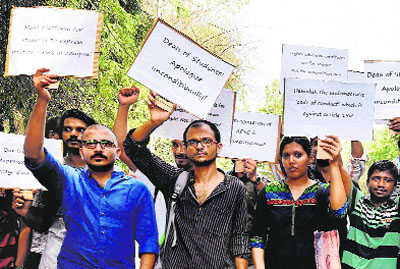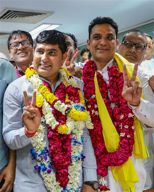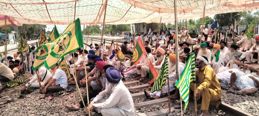
The decline of educational institutions will eventually affect all of us. Students of IIT-Madras hold a protest against the HRD minister and the management in the campus in Chennai. PTI
Surinder S. Jodhka
All modern democratic societies have a complex social organisation and a range of diversities. Notwithstanding the popular expectation of modernity melting differences, diversities have only grown over time. Even relatively smaller countries of Western Europe, where the form of democracy, as we know it, first evolved and where economic modernisation has a long history of more than two centuries, have tended to become more diverse with time.
These diversities are obviously of culture, language, community and the general ways of life. Modern societies also have other forms of diversities, which do not emanate from tradition and culture. They are the diversities produced by social and economic differentiations that accompany the processes of economic growth and urbanisation. The obvious examples of this would be the class-based inequalities, settlements and the continued significance of gender, age and political/ideological orientation.
At another level, as a system of political organisation, democracy has certainly come to be seen as the only viable system. Every country of the world today claims to be a democracy of some sort. Democracy has become an ideal form of political system, a norm.
Modern democracy is indeed about electing governments through periodic elections. But it is much more. Democratic systems have to be also backed by a set of rules and principles, which are enshrined in the Constitution and/or followed as conventions, often supported by Law. The Constitutions reflects the ideals and ethos of a country, its future directions and its promise to its citizens. It is the mandatory commitment of the ruling elite to these ethos and ideals that prevent democracies from becoming majoritarian regimes.
Democracy is also not only a system of government. It is also a principle of social and political organisation. It is about rights and participation. The idea of citizenship does not end with just the right to vote or to be elected to represent a constituency. Being able to vote or win is but the starting point. Citizenship also means being able to participate in the social and economic life of the nation as “equal” members. Though liberal democracy does not ensure substantive equality, it does promise formal equality. Thus even when inequalities of income and wealth may grow in capitalism, the economic systems that prevail in today's democracies the world over, they do not justify social inequality. Even in countries like India where inequality has been culturally embedded in its ethos thanks to the institutions like caste, traditional hierarchies are no longer legally defensible, not even in the private or personal lives of communities.
It is in this context that the idea of citizenship and modern institutions assume critical significance for a democratic system. The promise of formal equality is supposed to ensure that the political system must work towards enabling every citizen to participate on more or less equal terms in the life of the nation. In other words, societies and their political systems have to work towards building level playing fields. This is why things like education, housing and health become essential components of the state policy in most democratic countries and the governments feel compelled to spend a good amount of their money on providing quality education, healthcare and security of food to all.
Constitutional “ideals and ethos” have to be also translated into rules and procedures. While the economy of pre-modern societies was largely organised around kinship and family, modern-day liberal democracies work through individual merit. It is only through the value of individual merit that we could ensure formal equality: in principle everyone is equal. As per the norms, one's family, caste or gender is of no significance or value in modern economic and political life. Even a child of a poor landless labourer can qualify for admission to an institution like the IIM or IIT and secure a job in the top-ranking civil services through an open entrance exam. S/he has unalienable right to sit in class and work along with those from the third or fourth-generation middle-class urban elite.
Even though the Indian policy of caste/community reservations are often pitted against the idea of merit, this is a false contradiction. Countries and societies like India, which have had a long history of rigid hierarchies, can progress towards building a level playing field only through a proactive and effective system of affirmative action. Even after more than six decades of the reservation policy, institutions like caste continue to shape the structures of opportunity in India. Similarly, inter-community prejudice is not simply a matter of mentalities. They also shape markets.
Democracy is thus not simply about state power. If it has to work effectively, it must be translated through newer forms of modern institutions, which work within the constitutional framework. Even markets are expected to stay within the democratic ideals of the political system. Almost all democratic societies have laws against discrimination at the workplace and many private companies in the leading capitalist economy of the West openly advertise their recruitment policies as being supportive of affirmative action. Institutions also work as buffers between political power and lay individuals. For example, even when a political regime is corrupt, legal institutions and the media are supposed to work towards making it accountable.
An effective democracy gives freedom to all its citizens to form groups and parties and participate in the democratic political process. The political party in power indeed has the right and the duty to make sure that the foundational institutions of democratic system, which include educational institutions and those of civic governance. However, quite like the simple idea of liberal democracy, modern-day institutions and the normative frames of their working, ought not to be subjected to the ideology of any specific political party.Specialised institutions, such as hospitals, universities and other centres of higher learning (IITs, IIMs or the FTTI in Pune) ought to be left to themselves as long as they operate within the framework on the Constitutions and collectively cherished values of liberal democracy.
Not only do they deserve to be protected, they ought to be encouraged to keep checks on the political system.To assume that the party in power has the right to appoint individuals of its own choice to head specialised institution, simply because it has won an election, is not only against the grain of a liberal democratic governance system, but in the long run it will also be counterproductive for everyone. A decline of institutions would be a decline of the nation and its resources, in which we all have stakes, including those who are in power. At the end of the day those in power too would want their children to go to a university or a college that trains well.
— The writer is Professor of Sociology, Centre for the Study of Social Systems, Jawaharlal Nehru University, New Delhi.



























